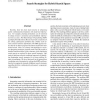Free Online Productivity Tools
i2Speak
i2Symbol
i2OCR
iTex2Img
iWeb2Print
iWeb2Shot
i2Type
iPdf2Split
iPdf2Merge
i2Bopomofo
i2Arabic
i2Style
i2Image
i2PDF
iLatex2Rtf
Sci2ools
111
click to vote
ICTAI
1999
IEEE
1999
IEEE
Search Strategies for Hybrid Search Spaces
Recently, there has been much interest in enhancing purely combinatorial formalisms with numerical information. For example, planning formalisms can be enriched by taking resource constraints and probabilistic information into account. The Mixed Integer Programming (MIP) paradigm from Operations Research provides a natural tool for solving optimization problems that combine such numeric and non-numeric information. The MIP approach relies heavily on linear program relaxations and branch-andbound search. This is in contrast with depth-first or iterative deepening strategies generally used in AI. We provide a detailed characterization of the structure of the underlying search spaces as explored by these search strategies. Our analysis indicates that the traditional approach of identifying dominating search strategies for a given problem domain is inadequate. We show that much can be gained from combining search strategies for solving hard MIP problems, thereby leveraging the strength of...
Artificial Intelligence | Combinatorial Formalisms | ICTAI 1999 | Iterative Deepening Strategies | Search Strategies |
Related Content
| Added | 03 Aug 2010 |
| Updated | 03 Aug 2010 |
| Type | Conference |
| Year | 1999 |
| Where | ICTAI |
| Authors | Carla P. Gomes, Bart Selman |
Comments (0)

